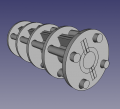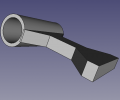Soil Mixer 2019: Difference between revisions
Jump to navigation
Jump to search
(→CAD) |
(→CAD) |
||
| Line 1: | Line 1: | ||
=CAD= | =CAD= | ||
[[File:hammermillrotor.png|100px]][[File:hammermillhammer.png|100px]][[File:hammermillrotor2.png|100px]][[File:4hamma.png|100px]] | [[File:hammermillrotor.png|100px]][[File:hammermillhammer.png|100px]][[File:hammermillrotor2.png|100px]][[File:4hamma.png|100px]][[File:16hamma.png|100px]] | ||
<gallery perrow=6> | <gallery perrow=6> | ||
Revision as of 21:20, 26 August 2019
CAD
Hammer mill rotor - FreeCAD -File:Hammermillrotor.fcstd
Hammer mill rotor - FreeCAD -File:Hammermillhammer.fcstd
Concept
Concept Feedback
From Aidan
Hey, here is my feedback on the first concept in question form:
- How do we know that a repeatable amount of soil and stabilizer will fall through the loading drawer aperture? Do we have a way to apply a force other than gravity to give better cycle to cycle repeatability?
- MJ: Depends on soil quality in both cases. Input soil has to have the right moisture content and particle size. Auger AND drawer loader will not work without proper soil quality in the first place. Can you find out from Rob if his Auger works under real life conditions
- Rob is very enthusiastic about his mixer. He says it works great and has offered to work with us to supply a mixer to Belize. Emails here.File:ADW Beddingfield Mixer.pdf Aidan Williamson (talk) 23:21, 13 August 2019 (UTC)
- How can we vary the ratio of soil to stabilizer in the field? Would the users be able to modulate the aperture size?
- MJ: that needs to be designed. Inserts into the cement drawer chamber would be one way to do it.
- What would eject the material up and out of the chute after mixing is complete? How do we know all the material would be thrown out?
- MJ: Hammermill ejects mix when drawer is opened. Tolerance of hammermill hammers to chamber walls determine how well soil is emptied.
- At what point is water incorporated into the mixing process? Is the water added to the soil beforehand? This soil would have a higher moisture content than the final mix would and this would lead to bridging in a hopper. Consider this when analyzing this point.
- MJ: Don't know without seeing how it works in practice.
- The mixing would take longer than a compression cycle. That is my intuition and it may be wrong. Would this one brick mix quantity be sent to an accumulator so that the brick press is not operating at a reduced speed?
- MJ: Conservation of energy says that unless you have another power source, you will get fewer than the rated 6 block per minute that obtain from CEB press only operation. Ideally we have another hydraulic takeoff from a tractor or bobcat that powers the mixer.
- Can we some way do the soil loading without an additional hydraulic actuator (or with a much less expensive cylinder)?
- There is no additional hydraulic actuator. One cylinder runs loading and ejection.
- For Lime Blocks: A retention time is encouraged by texts on the subject, a time between mixing and compression. In what ways could our mixer accommodate this step?
- MJ: Don't know, haven't tried it.
Soil Mixer Genealogy
Industry Standards
BOM






